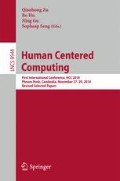Abstract
At present, all kinds of malicious acts appear in C2C online auctions, particularly the phenomenon of trust lack and credit fraud is very outstanding. Therefore, how to build an effective trust model has become a burning problem. Based on analyzing limitations of the existing online trust transaction mechanism, and according to characteristics (such as dynamic, innominate and suppositional) of online transaction trust problem, the article proposes a dynamic trust calculation model and reputation management mechanism of online trading based on multi-Agent system.. The model consists of three parts. The first part is the trust of user domain, to put importance on the influence on current trust by recent credibility status, to motivate users to adopt a agreed cooperative strategy. The second part is the weighted average of reputation feedback score, The weighted part mainly considers the trust from the reputation feedback score person (the credibility of the feedback score), the value of the transaction (to prevent the “credit squeeze”), temporal discounted (“guard against the fluctuations of the credibility”) and other factors; the third part is to give a weighting on the community contribution, according to the action taken by a user to the other members of the community in a time domain, to increase or decrease the user’s trust to isolate the feedback submission of the credibility and punish the fraud. The paper builds the fraud limition mechanism which combine the prevention beforehand, coordination in the event and punishement afterwards. The mechanism makes the online transaction safe. Theoretic proof and experimental verification indicate the following three problems can be solved effectively: 1) solving the problem which is difficult to prevent and is that peculative user accumulates the little trusts and squeeze on the large trading; 2) preventing members from cheating by false trading or personation; 3) reducing the arbitration workload of the online business platform.
Access this chapter
Tax calculation will be finalised at checkout
Purchases are for personal use only
Preview
Unable to display preview. Download preview PDF.
References
Tian, J., Han, L.H.: Online auction fraud prevention measures Comparative Study. Jiangsu University of Science and Technology (Social Science Edition) 8(4), 44–47 (2008)
Kiku, J., Lori, N.K.L.: Trust in consumer-to-consumer electronic commerce. Information & Managemaent 45(2), 88–95 (2008)
Nan, H., Ling, L., Sambamurthy, V.: Fraud detection in online consumer reviews. Decision Support Systems 50(3), 614–626 (2011)
Zhang, E., Yang, F., Wang, Y.: Online trading transaction integrity incentive mechanism design. Management Science 10(1), 64–70 (2007)
Dellarocas, C. Efficiency through feedback2contingent fees and rewards in auctionmarketp laceswith adverse selection and moral hazard. In: Proceedings of the 4th ACM Conference on Electronic Commerce, pp. 11-18, California (2003)
Dellarocas, C.: Goodwill hunting: an economically efficient online feedback mechanism for environments with variable product quality. In: Padget, J., Shehory, O., Parkes, D.C., Sadeh, N.M., Walsh, W.E. (eds.) AMEC 2002. LNCS (LNAI), vol. 2531, pp. 238–252. Springer, Heidelberg (2002)
Ba, S., Whinston, A.B., Zhang, H.: Building trust in online auction markets through an economic incentive mechanism. Decision Support Systems 35(3), 273–286 (2003)
Tian, H., Guo, Y.: Group negotiation model based on credible threat of its application. Management Science 7(5), 9–17 (2004)
Li, X.: Online Auction Decision. Economic Management Press, Beijing (2009)
Jiang, W.J., Zhong, L., Ji, J., Wu, Y.H.: Research on the Trust in Supply Chain Dynamic Collaboration Based on MAS. Advanced Materials Research 282–283, 470–473 (2011)
Jiang, W.J., Zhang, L.M., Wang, P.: Research on Grid Resource Scheduling Algorithm Based on MAS Coop- erative Bidding Game. Chinese Science F 52(8), 1302–1320 (2009)
Jiang, W.J., Zhang, L.M., Wang, P.: Dynamic computing resource optimization scheduling model MAS coordination mechanism. Scientific China 39(9), 977–989 (2009)
Jiang, W.J., Zhong, L., Zhang, L.M., Shi, D.J.: Dynamic cooperative multi-agent model of complex system based-on sequential action’logic. Chinese Journal of Computers 36(5), 115–1124 (2013)
Xu, J., Si, G., Yang, J.: A network configuration software trusted entity model and metrics based on trust evaluation. Chinese Science: Information Science 43(1), 108–125 (2013)
Author information
Authors and Affiliations
Corresponding author
Editor information
Editors and Affiliations
Rights and permissions
Copyright information
© 2015 Springer International Publishing Switzerland
About this paper
Cite this paper
Jiang, W., Xu, Y., Guo, H., Zhang, L. (2015). Multi Agent System-Based Dynamic Trust Calculation Model and Credit Management Mechanism of Online Trading. In: Zu, Q., Hu, B., Gu, N., Seng, S. (eds) Human Centered Computing. HCC 2014. Lecture Notes in Computer Science(), vol 8944. Springer, Cham. https://doi.org/10.1007/978-3-319-15554-8_14
Download citation
DOI: https://doi.org/10.1007/978-3-319-15554-8_14
Published:
Publisher Name: Springer, Cham
Print ISBN: 978-3-319-15553-1
Online ISBN: 978-3-319-15554-8
eBook Packages: Computer ScienceComputer Science (R0)

